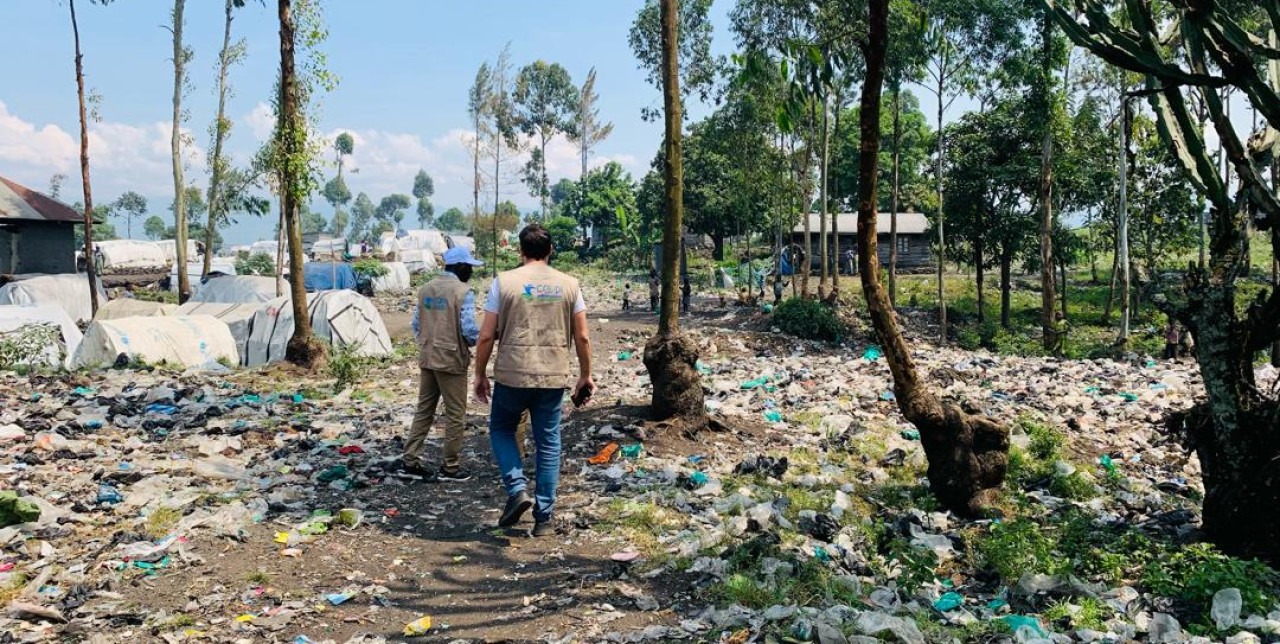16-07-2024 | di COOPI
Crisis in eastern DRC worsens: NGOs appeal to international community
In the latest episode of a resurgence in conflict and violence in eastern DR Congo, hundreds of thousands of people have been forcibly displaced as civilians, civilian infrastructure and NGO staff and assets are increasingly targeted. The involvement of neighbouring countries through their proxy support to non-state armed groups, the presence of several national and regional armed forces, and more than 120 armed groups represents an over-militarization of the region and adds a layer of complexity to the conflict in DR Congo which, if not contained, could lead to a regional escalation. Coopi - Cooperazione Internazionale, as a member of the Inter Agency Working Group (IAWG) in East and Central Africa, joins the call of NGOs to stop violence in eastern Democratic Republic of Congo.
While North Kivu has been plagued with conflict for over two decades, the current situation has drastically deteriorated, triggering a catastrophic protection crisis. Parties to the conflict now regularly use heavy artillery including mortar, grenades and bombs, and deliberately target civilians, including internally displaced persons (IDPs). IDP sites in Sake and Goma were shelled in February 2024, and commercial boats on Lakes Kivu have also been targeted since March 2024. On 3 May 2024, at least 18 civilians were killed – most of them women and children –and 32 were wounded in attacks on IDP sites near Goma. And on 30 June, two aid workers were killed and several injured in an attack on an aid convoy near Butembo.
Other violations including arbitrary arrests and detentions, extrajudicial executions, forced recruitment, kidnapping and sexual violence are also committed with impunity. In April 2024 alone, more than 1,700 new cases of sexual violence were reported in IDP sites. We also know that most cases of sexual violence are not reported due to the fear of stigmatisation, exclusion, retaliation, rejection, and a culture of impunity.
2.8 million people are now displaced in North Kivu province, of whom over 540,000 are in and around Goma. A single offensive by a non-state armed group in June 2024 displaced over 350,000 people. People have been displaced multiple times: more than anything, they want peace, and they want to return home.
Despite staggering and growing humanitarian and protection needs, access to affected populations is increasingly constrained. Credible accounts indicate that parties to the conflict have militarised and established presence in and around IDP sites, thereby compromising their civilian character and posing serious risks not only to IDPs but also to humanitarian personnel. Humanitarian access is also constrained by bureaucratic impediments, roadblocks that have disrupted critical supply routes and disregard for International Humanitarian Law. As a result, many national and international non-governmental organisations have had no choice but to suspend operations in Mweso, Bambo, Sake and Kanyabayonga. This suspension has exacerbated the humanitarian situation and increased the burden on only a few organisations to deliver lifesaving assistance to affected communities. All this is happening despite coordinated peacekeeping and deconfliction initiatives designed to protect civilians and ensure unimpeded access to assistance.
The situation is increasingly complex, and urgent action is necessary to address the escalating protection and humanitarian needs of conflict-affected populations, both in camps and rural areas. To allow this, all efforts must be made to de-escalate the conflict, and to ensure the protection of civilians as well as safe and unhindered access for frontline aid workers engaged in the delivery of life-saving humanitarian assistance’’
says IAWG Director Peter Burgess.
The planned withdrawal of the UN Integrated Peacekeeping Mission (MONUSCO) is likely to lead to a power vacuum, allowing non-state armed groups to consolidate and escalate their activities and subsequently leading to a surge in violence, human rights violations, and further population displacement. More than 80 percent of the IDPs in the country reside in areas protected by MONUSCO, raising the possibility of a humanitarian catastrophe in the event of a rushed and disorderly withdrawal.
The clock is ticking for civilians. As the crisis continues to be overshadowed by other humanitarian emergencies and despite the intensification of the conflict, political leaders and donor agencies across the world remain inexplicably disengaged from the tragedy that is unfolding.
We strongly urge all parties to the conflict to take concrete steps to protect civilians, especially women, girls and children, to guarantee immediate and unhindered access to humanitarian assistance, and to also guarantee the free movement, safety and security of humanitarian staff and assets, who should never be targets of violence. This includes demilitarising and withdrawing from IDP sites which provide a place of refuge for people already displaced by violence.
We also call upon the Government of DR Congo and the United Nations to ensure the meaningful and accountable participation of civil society, local actors, and INGOs, as well as representatives of affected populations, in all stages of the withdrawal of MONUSCO and the future reconfiguration of tasks. It is vital that the withdrawal takes place in a responsible and phased manner that does not create security and logistical vacuums, and which guarantees civilian protection, safety of humanitarian staff and access to humanitarian assistance.
Finally, we call on the UN Security Council to foster a stronger political dialogue towards de-escalation, addressing the growing involvement of neighbouring countries, and working through the Nairobi and Luanda processes, ensuring the meaningful participation of national and local actors.
Signatories:
Coopi Cooperazione Internazionale - Actionaid – Catholic Agency for Overseas Development – Concern worldwide – DRC Danish Refugee Council – Intersos – International Rescue Committee – Islamic Relief – Mercy Corps – Oxfam – Save the children – Teartfund




 Democratic Republic of the Congo
Democratic Republic of the Congo